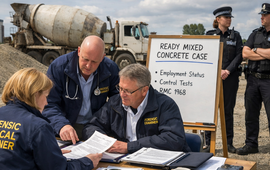
Most great consultancies typically start with one consultant (or contractor) who decides to expand their operations and take on bigger projects for customers. More extensive projects often involve hiring sub-contractors to work alongside the founder to deliver the outcomes. Expansion proceeds and the founder solely focuses on building a sustained business pipeline by sourcing and overseeing the projects.
After years of hard graft, having built up a strong reputation, client list and provable ongoing revenues, the company has intrinsic sellable value. It could be sold for a multiple of its annual profits, easily exceeding £1,000,000. That’s the dream.
However, the dream will fail if the founder has not paid attention to all areas of tax compliance, including IR35.
Is this you? Is this your plan? If so, you need to start thinking about IR35 sooner rather than later, even when you are still a small business.
The small consultancy IR35 advantage
First, let's define what a "small" consultancy means. To qualify as a small company, a business must meet 2 of the following 3 criteria:
| Measure | Threshold |
|---|---|
| Turnover | No more than £15m |
| Balance sheet total | No more than £7.5m |
| No. of employees | Not more than 50 |
One consequence of the Off-payroll legislation (Chapter 10 ITEPA 2003), which rolled out to the private sector in April 2021, is the increase in medium and large firms using consultancies to supply services for their project needs instead of using recruitment agencies.
Where a consultancy provides a wholly outsourced service, the consultancy is the “client” in terms of the Off-payroll legislation, which means the hiring firm does not need to consider the legislation, and has no tax risk. Even more attractive for firms who are risk averse is where the consultancy is small, in terms of the Companies Act 2006, because the tax liability sits with the contractor’s limited company, and neither the client nor the small consultancy has any tax risk.
But, a lack of attention to IR35 compliance can be a disaster. Consultancy owners could find, at the point of selling their business, that they’ve spent years building what they believe to be a lucrative enterprise only to get a rude awakening during the due-diligence process, ultimately discovering that they are sitting on a pile of tax risk which no one wants to buy.
Where the dream can fail
When you attempt to sell your business, a prospective buyer will conduct extensive due diligence. Uncovering material risks may result in an aborted sale or a lower valuation. You will also be required to provide personal warrants and indemnities to cover any tax risks from when you owned the company. So, forget buying that Ferrari – because the buyer might want a considerable sum tied up in an Escrow account for 4-6 years.
The best sale is where you can walk away quickly and cleanly, ensuring the firm hasn’t built up IR35 tax risk.
So, where does IR35 come in?
IR35 risk to small consultancies
Some examples, or “IR35 horror stories” that can devalue your business:
- Your contractors get investigated by HMRC and determined to be “Inside IR35” – they try to defend themselves because they cannot afford proper representation, and neither can you. They, and you, become embroiled in long-term litigation, harming your business. The contractors then group litigate against you for negligence.
- HMRC investigate your clients and decide that your firm is not providing a wholly outsourced service, is akin to a recruitment agency providing individuals, and that those contractors are also “Inside IR35”. The client claims against an indemnity you signed or seeks to litigate based on your negligence. Either way, your business is doomed.
- After years of impressive profits, it comes time to sell. Due diligence reveals that your consultancy model isn’t quite what you think it is and that your firm has built up considerable tax risk: your buyer aborts, and your valuation plummets.
- HMRC discovers that you knew your contractors were inside IR35, not paying correct taxes, and you were, therefore, knowingly facilitating tax evasion, breaching s44(4) of the Criminal Finances Act 2017. Scary eh?
Why would you let any of this happen? Are you confident you have got everything right? Are you prepared to risk it? Would it not make sense to at least have a sense check?
Your business will have more value if it is built honestly and robustly.
How should a consultancy properly engage with IR35 and Off-payroll?
A consultancy owner can follow three key steps to help ensure IR35 compliance, leading to a smooth future sale:
Step 1: Get your contracts right
Getting your written contracts right is essential, and often where problems occur. Classic issues include poorly drafted contracts, off-the-shelf general contracts, or unsuitable agency-type contracts.
Ensure you use properly drafted commercial contracts that IR35 legal experts have checked. Use your contracts where you can. Where customers insist you sign their terms, always get them reviewed by a lawyer for contractual issues and IR35 issues.
IR35 Shield can review contracts for hiring firms and help fix any issues – or, often, buying our template contracts can be most cost-effective.
Step 2: Assess all your contractors
Assess all your contractors from day 1, even though you don’t strictly have to under the off-payroll legislation. Historically, contractors have not assessed their IR35 status, which is why the new legislation came in.
Just do the assessments for the contractors, and give them a copy of the assessment. You can ask the contractor to pay for the assessment or swallow the cost yourself. Assessments fees are insignificant compared to the total value of the contract.
We recommend you use IR35 Shield for Business.
Step 3: Protect against HMRC investigations
If HMRC investigates, they will run an investigation into the company that has the tax liability. For small consultancies, this means the contractors will be investigated. You do not want contractors trying to defend against HMRC themselves, causing massive contagion across your supply chain.
Whenever HMRC steps in, these enquiries need professionals to deal with them.
IR35 Shield can help – ask each contractor to become a member of IR35 Shield for Contractors (£199 + VAT per year). Once they are a member it costs you nothing to assess them, and they get our Tax Investigation Service included. If HMRC knocks on the door, we will handle the enquiry, which is underwritten by £125,000 of tax defence fees.
How IR35 Shield can help your consultancy
The three steps are summarised:
- Contracts – buy or review: Make sure agreements are watertight. Purchase template contracts from IR35 Shield or have existing contracts reviewed by IR35 Shield.
- Assess all contractors: Use IR35 Shield for Business, and assess all your contractors.
- Protect against HMRC: Encourage your contractors to become members of IR35 Shield for Contractors.
Our experience demonstrates that consultancies who work with IR35 Shield and adopt the 3-step plan are more commercially attractive and have a marketing edge. Some large businesses will also insist the consultancy is assessing contractors and properly engaging with them to help them demonstrate compliance with the Criminal Finances Act 2017.
Ultimately, when it comes to selling your business, having already done all the IR35 compliance work will make the sale much easier, and you will avoid having horrendous tax risk hovering over you for years after the sale.
If your business needs help and advice with this, or any other IR35-related matter, please get in touch.
Book a free consultation


